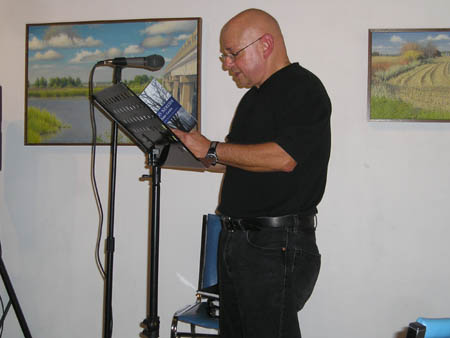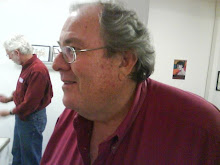
On April 28 William O’ Daly came into Sacramento heading down I-80 from Auburn to talk about the work of his life-long mentor-in-translation, love poet and political poet, Pablo Neruda.
He quickly began his thousand weavings between the books of poems he has translated late in Neruda’s career. They were books that Neruda scrambled to finish as he felt his health deteriorate. O’ Daly has translated Still Another Day, The Separate Rose, Winter Garden, The Sea and the Bells, The Yellow Heart, The Book of Questions, and forthcoming is The Hands of the Day(coming out very soon) and World's End (available in January 2009), all from Copper Canyon Press.
The first poem that O' Daly read was one of his own entitled "The Turning Year," from a new manuscript.
The first book he read from was Still Another Day, a book that Neruda wrote in 1969 when he took two days off from World's End.
From that book he read “I (first in Spanish and then in English),” “XVII,” and “XVII” from this book-length long poem with 27 parts (each with the title of a Roman numeral).
The second book he read from was The Separate Rose, a book that arose from one of Neruda’s trips to Rapa Nui (Easter Island). The book is divided into poems that fit into one of two categories, that of “The Island” (which Neruda praises) and that of “Men” (which Neruda often speaks of, sometimes disparagingly). There are 24 sections that fall into one of these two categories of “The Island” or “Men.”
He read from “The Island (VI)” and “Men (IX)”
Then O’Daly read from The Book of Questions, a book that fulfilled a long-considered project of Neruda’s. The Book of Questions consists of 74 octets (mostly) comprised of four couplets with each couplet a question.
From this book he read “XXV”
Why did the grove undress itself only to wait for the snow?
The next book O’ Daly read from was Winter Garden. He read “Bird” and “Homecomings.”
O’Daly progressed to The Sea And the Bells. The first piece he read from this collection (whose order and assemblage were determined by Neruda but many of the pieces remain untitled) was “Untitled”
The second poem from The Sea and the Bells was “Untitled”
The next poem he read was one that he wrote in the guest book after touring Villa Grimaldi, a complex of buildings where Pinochet interrogated and tortured political prisoners. It is from The Sea and the Bells
If each day falls
inside each night,
there exists a well
where clarity is imprisoned.
We need to sit on the rim
of the well of darkness
and fish for fallen light
with patience.
O’ Daly proceeded to the first of his new manuscripts, The Hands of Day. Critics have commented that this book arose from Neruda’s guilt at not ever having to make things with his hands.
The first poem he read from this collection was called “Emptiness” which possessed my favorite line of the night:
and how is a sea made? Waves. Ovaries and dead ships.
The second poem was “Destinies,” then “Close to the Knives” and “Not Everything is Now.”
He skipped back to The Book of Questions to read “LXXIII”
Who works harder on earth,
a human or the grain’s sun?
Between the fir and the poppy
whom does the earth love more?
Between the orchids and the wheat
which does it favor?
Why a flower with such opulence
and wheat with its dirty gold?
Does autumn enter legally
or is it an underground season?
Then he read VIII (What is it that Upsets the Volcanoes)
From The Yellow Heart he read “Reject the Lightning.”
Then he returned to his own work from his new manuscript. The first poem, completed one week before the reading, was entitled "The Flag is Burning," a companion piece to a poem (which he didn’t read) called “To the Forty-Third President of the United States of America,” written at the beginning of The Iraq War in 2003. Both poems were composed in protest of the war. The first time he had the opportunity to read "To the Forty-Third President…" was at an event in Vermont attended by 750 people.
The second piece and final piece of the evening was entitled “New Year Manifesto.”





















No comments:
Post a Comment